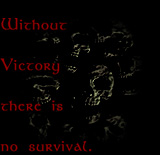|
|
|
|
|
|
|
|
|
 |
|||||||
|
|
|
||||||
 |
|
||||||
|
|
|||||||
|
Seven Course Meal Hello, and welcome to my
first article here at Pojo. My name is Andrew Chapman,
and I am currently residing in Brockport, NY, which is
just west of Rochester. I have been playing Magic since
Ice Age, and playing competitively since the Tempest
block. In general, I only play type 2, but I do
occasionally play other formats. Though I have a wife
and one-and-a-half children (that means I have one on
the way for those of you not familiar with the terms of
a young, growing family) at the age of 21, I manage to
play every week (it helps that she plays, too). Outside
of playing Magic, I am a Physical Education student at
SUNY Brockport, and I find work wherever I can. Net-decks are everywhere
we look nowadays, and you could know what to expect at
an up-and-coming local tournament simply by spending an
hour or two looking on the internet. There are others,
however. There are those people who dare do be
different, even when facing the possibility of
humiliating failure. Those people are your local
"rogues". Seven Course Meal by Andrew Chapman 4x Soul Feast SB 1x Innocent Blood Well, when you first see
the deck, it isn't obvious as to what it exactly does.
In fact, many people that I show it to say the exact
same thing to me, "How do you win?" It's when
you play it that you start to realize it's potential.
The first odd thing you see about the deck is one of its
strongest points. The deck has virtually no non-land
permanents, and absolutely no creatures. Think to
yourself how many decks run removal spells of any type
and then note how MANY of these removal spells these
decks pack. Those spells are dead (or at least greatly
hindered) in your opponent's hand, making their
resources more limited than what they might like. The
three enchantments may get destroyed if/when they come
out, but hardly ever warrant keeping any enchantment
removal in after side-boarding if they can help it. Even
after side-boarding, your opponent will, more times than
not, still have less-than-efficient cards to deal with
your plans. This form of resource disruption can prove
very fatal for many the opponent. So this concludes my
first deck presentation. Feel free to try Seven Course
Meal out for yourself. It takes a little time of playing
with it to get the feel for the deck, so don't give up
on it immediately. Until Braids becomes a
centerfold… Whitechrisrock@yahoo.com
|
|||||||

